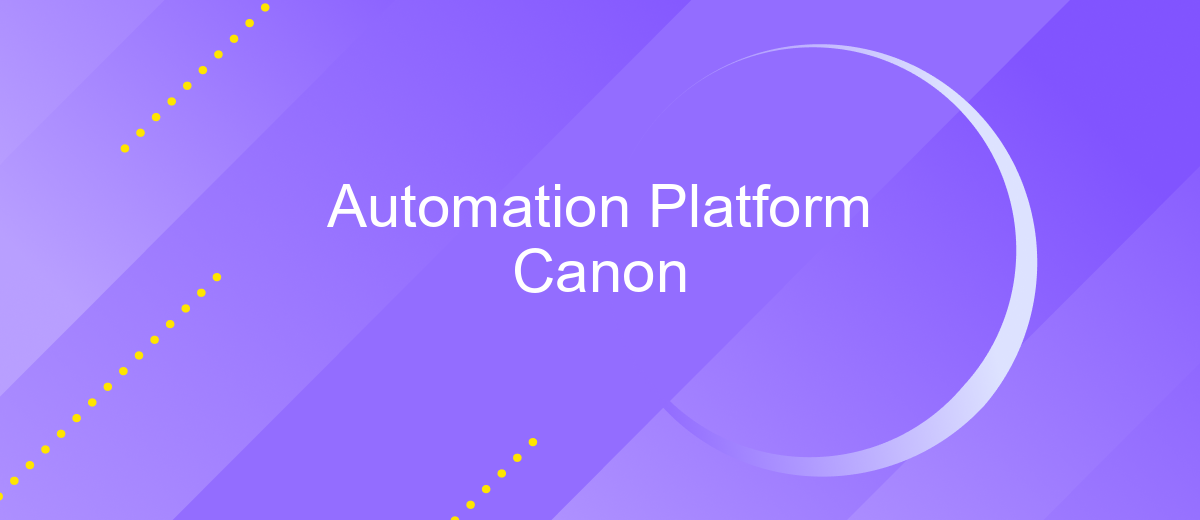Automation Platform Canon
The Canon Automation Platform revolutionizes how businesses streamline their operations by integrating advanced technology and user-friendly interfaces. This robust platform offers comprehensive solutions for automating workflows, enhancing productivity, and reducing manual errors. With its scalable and customizable features, the Canon Automation Platform caters to diverse industry needs, empowering organizations to achieve efficiency and innovation in their daily processes, ultimately driving growth and success.
Introduction to Automation Platforms
Automation platforms have become an integral part of modern business operations, streamlining processes and enhancing productivity. These platforms offer a comprehensive suite of tools that enable organizations to automate repetitive tasks, reduce human error, and optimize resource allocation. By leveraging advanced technologies such as artificial intelligence and machine learning, automation platforms can adapt to the evolving needs of businesses, ensuring scalability and efficiency.
- Task Automation: Automates routine tasks, saving time and reducing manual effort.
- Process Optimization: Enhances workflow efficiency by identifying and eliminating bottlenecks.
- Scalability: Easily adapts to growing business demands without significant infrastructure changes.
- Data Integration: Seamlessly integrates with existing systems to provide a unified data platform.
- Cost Reduction: Lowers operational costs by minimizing the need for manual intervention.
Incorporating an automation platform into business operations not only improves efficiency but also allows employees to focus on more strategic tasks. As technology continues to advance, these platforms are becoming increasingly sophisticated, offering robust solutions tailored to specific industry needs. By embracing automation, businesses can achieve a competitive edge, drive innovation, and ensure long-term sustainability in an ever-changing market landscape.
Key Capabilities and Features of Automation Platforms

Automation platforms are designed to streamline and enhance business processes by providing a suite of tools and features that automate repetitive tasks, integrate various systems, and improve operational efficiency. Key capabilities include process automation, where tasks such as data entry, notifications, and reporting are automated, freeing up valuable human resources for more strategic activities. Additionally, these platforms offer robust analytics and reporting tools, enabling businesses to gain insights and make data-driven decisions.
Integration is another crucial feature, allowing seamless connection between different software applications. Platforms like ApiX-Drive facilitate this by providing easy-to-use interfaces for setting up integrations without the need for extensive coding knowledge. This enhances workflow efficiency by ensuring data consistency across platforms. Furthermore, automation platforms often include customizable dashboards, real-time monitoring, and user-friendly interfaces, making it easier for teams to manage tasks and collaborate effectively. These features collectively empower organizations to optimize their operations and achieve greater productivity.
Benefits and Use Cases of Automation Platforms

Automation platforms have become an essential component of modern businesses, offering numerous advantages that streamline operations and enhance productivity. By automating repetitive tasks, these platforms free up valuable human resources, allowing teams to focus on more strategic initiatives. Additionally, they improve accuracy and consistency, minimizing the risk of human error and ensuring reliable outcomes. With the ability to integrate with various systems, automation platforms facilitate seamless data flow and enhance decision-making processes.
- Time-saving: Automating routine tasks accelerates processes and reduces time spent on manual operations.
- Cost efficiency: Decreasing the need for manual labor lowers operational costs and increases profitability.
- Scalability: Automation platforms can easily adapt to growing business needs, supporting scalability and expansion.
- Improved accuracy: By reducing human intervention, the likelihood of errors is significantly minimized.
- Enhanced customer experience: Faster and more reliable service delivery improves customer satisfaction.
In various industries, automation platforms are applied in diverse scenarios such as customer service, where chatbots handle inquiries, and in finance, where they process transactions and generate reports. In manufacturing, these platforms optimize supply chain management, while in marketing, they personalize customer interactions. By leveraging automation platforms, businesses can achieve operational excellence and maintain a competitive edge in the market.
Choosing the Right Automation Platform

When selecting an automation platform, it's crucial to consider the specific needs and goals of your organization. Start by evaluating the types of tasks you want to automate and the complexity of your workflows. Understanding these requirements will guide you in choosing a platform that aligns with your operational objectives.
Next, assess the scalability and flexibility of the platform. A suitable automation solution should accommodate future growth and adapt to evolving business processes. This ensures that your investment remains valuable as your organization expands and changes over time.
- Compatibility with existing systems and software
- User-friendly interface and ease of use
- Robust security features to protect sensitive data
- Comprehensive support and training resources
Finally, consider the total cost of ownership, including initial setup, licensing fees, and ongoing maintenance expenses. A cost-effective platform should provide a balance between functionality and affordability, ensuring a positive return on investment. By carefully evaluating these factors, you can select an automation platform that enhances productivity and drives organizational success.
Future Trends in Automation Platforms
The future of automation platforms is set to be defined by increased integration capabilities and enhanced user experiences. As businesses continue to adopt digital transformation strategies, the need for seamless integration between various tools and services becomes paramount. Platforms like ApiX-Drive are leading the way by providing versatile integration solutions that allow companies to connect disparate systems effortlessly. This trend towards more integrated ecosystems is expected to accelerate, enabling organizations to streamline operations and improve productivity.
Another significant trend is the rise of artificial intelligence and machine learning within automation platforms. These technologies are poised to revolutionize how businesses automate processes, offering predictive analytics and intelligent decision-making capabilities. Automation platforms will increasingly leverage AI to provide more personalized and efficient workflows, adapting to user needs in real-time. As these technologies evolve, they will empower businesses to achieve greater efficiency and innovation, driving the next wave of digital transformation.
FAQ
What is Canon's Automation Platform and how does it benefit businesses?
How can I integrate Canon's Automation Platform with my existing systems?
Is Canon's Automation Platform suitable for small businesses?
What types of processes can be automated with Canon's Automation Platform?
How secure is Canon's Automation Platform in handling sensitive data?
Apix-Drive is a simple and efficient system connector that will help you automate routine tasks and optimize business processes. You can save time and money, direct these resources to more important purposes. Test ApiX-Drive and make sure that this tool will relieve your employees and after 5 minutes of settings your business will start working faster.

